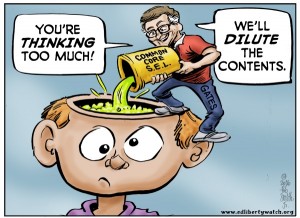The National Pulse – “Social Emotional Learning” Advocates Are Still Ignoring Its Many Problems
In this article, Dr. Effrem discusses the problems associated with the roleout of social emotional learning. especially how tracking social emotional learning skills is far less accurate when predicting future success in students.
The Collaborative for Academic, Social, and Emotional Learning (CASEL) — which receives our hard-earned taxpayer dollars to insinuate social emotional learning (SEL) standards and curriculum into every classroom in America from preschool on up — has found another voice to breathlessly tell us benighted parents and citizens that our children and their education will not survive unless and until SEL is everywhere. Giancarlo Brotto is the author of “The Future of Education Depends on Social Emotional Learning: Here’s Why,” the most recent piece of SEL cheerleading in EdSurge.
There are multiple problems with this piece. First, it ignores comments by SEL experts and proponents stating that there still is no good definition of SEL, as well as the negative SEL research. For example, Brotto did not mention this important study showing that academic skills in kindergarten are far more important than SEL in predicting academic achievement. Nor did he mention this meta-analysis, well discussed by Jane Robbins, showing that manipulating mindsets has no real effect on achievement.
You can view the full article at The National Pulse here.
The National Pulse – Texas School Safety “Action Plan” Contains More Problems than Solutions
In this article, Dr. Effrem discusses the new school safety initiatives out of Texas following the tragic school shooting in Santa Fe, and the problematic use of mental health screenings.
The first element of the plan is to “provide mental health evaluations that identify students at risk of harming others and provide them with the help they need.” This is the Telemedicine Wellness Intervention Triage & Referral (TWITR) Project, one of the programs that I wrote about several weeks ago. This program sends troubled students, referred by teachers, for screening by licensed professional counselors and, if necessary, for two telemedicine sessions with psychiatrists. According to the program’s data sheet, nearly 42,000 students were “impacted” by the program, with 1 percent (about 400) referred for triage and 215 receiving the counseling sessions.
However, while it may be a step forward that those truly in need of counseling are receiving it, there are several issues not mentioned in the information given. One unmentioned issue is the false positive rate of the screening. Although it is likely to be better than a standard written or online screen, because the screening is done by a licensed mental health professional, as previously discussed, the psychiatric profession readily admits that diagnosis is not standardized but is rather a consensus judgment, and diagnosing children and adolescents is especially difficult due to rapid developmental changes. A 2016 international psychiatric conference also highlighted the crisis of consensus for that specialty.]
You can view the full article at the National Pulse here.
The National Pulse – America Must Improve Its Horrible Psychiatric Care for Veterans
In this article, Dr. Effrem discusses the quality of psychiatric care for veterans in the United States and the problems linked to the use of some psychiatric medications.
As Memorial Day approaches, it is incredibly important that we pause from our rhetorical and political battles on the education front to remember, honor, and teach the next generation the stories of our military men and women. These soldiers, sailors, airmen, marines, and coast guardsmen fought and died to secure the heritage and blessings of our liberties. We are rapidly losing those who fought tyranny in World War II and the Korean conflict to age. The veterans of Vietnam are in middle age and are dealing both with the horrors of war and the poor treatment they received on their return due to the country’s conflict about our involvement there.
Tragically, in addition to those who made the ultimate sacrifice in battle, far too many military members that served in Iraq and Afghanistan are dying due to suicide and, in addition to physical wounds, are suffering from the ravages of Post Traumatic Stress Disorder (PTSD) and Traumatic Brain Injury (TBI). The care they should be receiving is too often inadequate, ineffective and, in the area of mental health, downright dangerous….
…As bad as David’s experience was with psychiatric medications, sadly, it pales in comparison to that of other veterans. According to a letter by Dr. Joseph Tarantolo, a Washington, D.C., psychiatrist who helps patients come off of psychiatric medications, one of his veteran patients came to him on nine different psychiatric medications at the same time, and had been prescribed more than forty of these drugs over seven years with terrible consequences. According to the letter:
When he arrived at my office on August 17, 2017, he was on high doses of nine different drugs all of which have had profound adverse reaction impact. Before arriving at the VA for medical care in 2010, his vision was perfect, now impaired. Before arriving at the VA he had normal GI functioning, now impaired. Before arriving at the VA, he had normal sexual functioning, now impaired. Before arriving at the VA, although in psychological turmoil, he had excellent cognitive function and could emotionally feel authentically, now, “I fake feeling. I know I’m supposed to feel but I can’t.” And he nods off in the middle of substantive discussion.
You can view the full article at The National Pulse here.
The National Pulse – Florida Seeks to Expand Ineffective Mental Health Screening in Schools
In her recent article for the National Pulse, Dr. Effrem discusses the failings of mental health data collection surrounding recent school violence.
The Florida Association of District School Superintendents (FADSS) held a conference to discuss how to expand school-based mental health that was attended by the state’s 67 superintendents as well as several legislators and agency heads.
Broward County Superintendent and FADSS president Robert Runcie led the meeting. Runcie was superintendent during the February 2018 shooting that occurred at Marjory Stoneman Douglas High School. Runcie and Broward County Sheriff Scott Israel are under intense scrutiny for ignoring or downplaying violent acts and threats by many students, including shooter Nikolas Cruz.
School officials ignored multiple felonious threats that Cruz made to various students, despite reports of them to those officials. Teachers and other school staff all over the country have noted how unsafe schools have become since the trend of not reporting school violence based on race and disability status — an approach pioneered in Broward County — spread nationwide under the Obama administration. Also, as previously reported, Cruz was well known to the mental health system, having been in an alternative school due to behavior problems; had been medicated for ADHD; and was being treated for depression, possibly with medication, at the time of his crimes.
As in the Texas situation, mental health data mining is a big deal. Superintendents from small, rural counties were told that in order to keep the money spigot open, the outcomes data for their mental health programs is “essential.” What the superintendents and legislators do not understand is how subjective and inaccurate mental health data and surveys that pull students into these programs — particularly screening and social emotional learning (SEL) surveys, as well as universal behavioral modification and outcome data — can be. We have previously discussed the Columbia Teen Screen survey that was only correct about 16 percent of time in accurately finding teens that actually had mental health issues requiring follow-up (called the Positive Predictive Value or PPV). Another review showed that only two of nine commonly used depression screening scales had a PPV at fifty percent, or no better than a coin flip.
You may read the full article here.
Issues
- Assessments + Testing (25)
- Bullying/Sex Education (6)
- Child Protection League (2)
- Common Core Standards (78)
- Curriculum + Standards (65)
- Data Collection and Data Privacy (64)
- Early Education/Nanny State (75)
- Federal Education (128)
- International Education (6)
- LGBT Issues in Education (9)
- Media Appearances (4)
- PL/CBE (2)
- Planned Economy (11)
- Politics of Education (26)
- School Violence (9)
- Social Emotional Learning/Mental Health (52)
- State Education (89)
- Testimony/Presentations (17)
- Uncategorized (13)
- Unions (10)
Education Liberty Watch Projects
ELW Allies
- American Principles Project
- Cato Institute
- Conservative Teachers of America
- Constitutional Coalition
- Eagle Forum
- Minnesota Advocates and Champions for Children
- Missouri Education Watchdog
- Restore Oklahoma Parent Empowerment
- Stop Common Core
- The Pioneer Institute
- Truth in American Education
- What is Common Core – Education Without Representation




